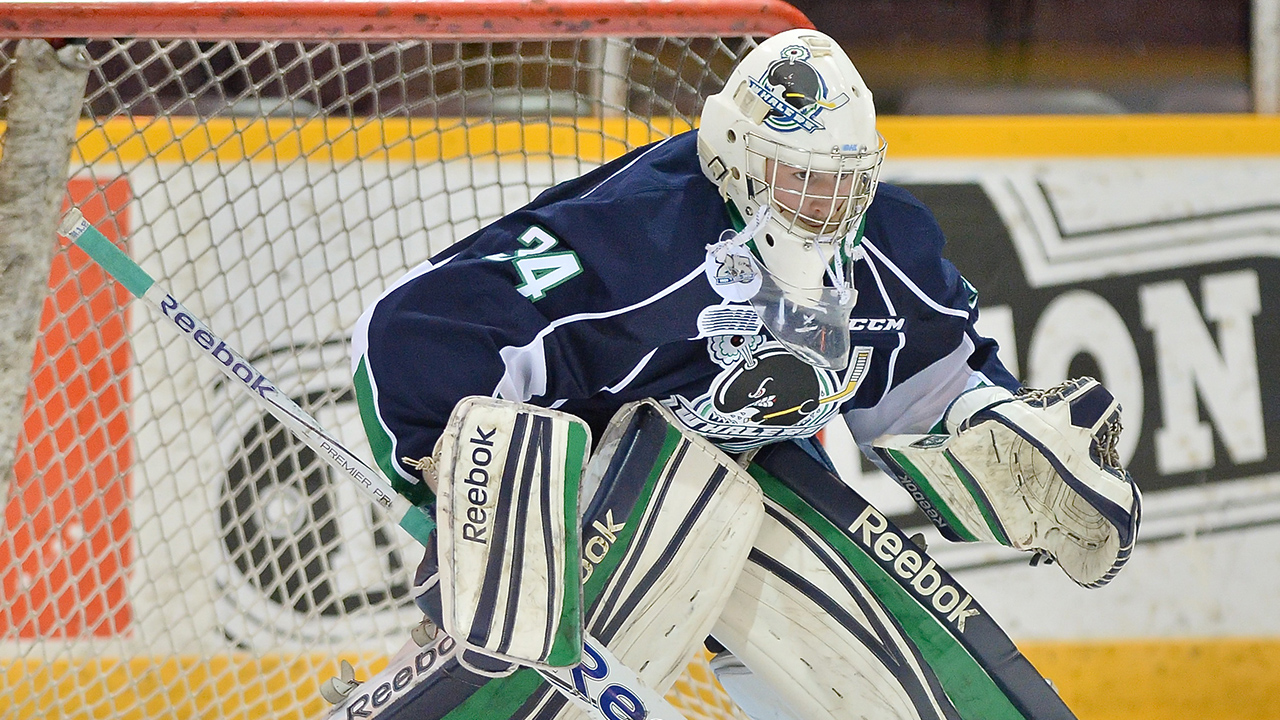The OHL lowering the fight threshold from 10 to three seems radical—until one looks at how few players the tighter restriction would have actually impacted last season.
The league took a major step in its graduated phaseout of fighting in 2012–13 when it implemented a rule imposing an automatic two-game suspension for any player who accumulates more than 10 fighting majors during the regular season. (Credit where credit is due: the rule was first tried in Junior A.) Fighting has dropped about 50 percent over the past four years.
The cut is a natural progression, and seems more realistic than a zero-tolerance policy where fighters are automatically ejected. The mounting evidence about the long-term effects of brain injuries to 16- to 20-year-old athletes has also imposed a moral obligation for the OHL to make fighting and blindside checks to the head—which will also be more heavily penalized—a very limited part of the league. The stricter rule is probably also an indirect acknowledgement that the OHL has to make its developmental league look more presentable to prospects with options in Europe or the USHL/NCAA stream.
All told, only 55 players—fewer than three per team—fought four or more times last season. The Kingston Frontenacs, who accumulated a league-most 62 fights, had eight players fall in that range, and the Saginaw Spirit had five. There were six teams that would have had no more than one player effected—including the Erie Otters, who finished first overall.
Point being, there is still room for a good scrap that is the honest outgrowth of emotion. The majority of OHL players will drop the gloves at some point this season, but it will probably happen more in isolation. As a case in point, the Barrie Colts, who were skilled team with no small amount sandpaper, had 16 players contribute toward their total of 36 fights. Only three did so four times.
In the four seasons since the 10-fight threshold was imposed, only one player, the Peterborough Petes’ Derek Mathers during the first season under the rule, has ever been suspended for going over the limit. Owen Sound Attack defenceman Jacob Friend had a league-most 13 fighting majors last season, but three didn’t count towards the limit because his combatant received an instigator penalty. The Los Angeles Kings draft choice hit the limit in the fourth-last game of the regular season. Somehow, in spite of fighting apologists’ claim that taking away a player’s wherewithal to drop the gloves will zap his confidence to play his game, Friend had four points in the three remaining games.
Wheat Kings getting a Grant?
Kelly McCrimmon will surely leave his front office duties with the defending WHL champion Brandon Wheat Kings in capable hands, and the smart money is saying that will be Grant Armstrong.
Armstrong has been part of the Victoria Royals organization for the past four seasons. The North Vancouver, B.C., native spent the previous four in Portland under Mike Johnston when the Winterhawks were beginning their resurgence.
McCrimmon, now the assistant GM of the Las Vegas NHL expansion franchise, still owns the Wheat Kings. Brandon has re-organized its coaching staff, with 30-year-old David Anning becoming head coach. Don McGillivray, one of the winningest coaches in Junior A history and a former University of Manitoba bench boss, has come aboard as an assistant. Of course, with any transition that involves a coach-GM-owner leaving, sorting out who will be behind the bench is the least taxing part.
London calling for barred goaltender
Just when one thinks the NCAA is reconnecting to reality, along comes a saga such as the one that ended with 6-foot-3 goaltender Tyler Johnson signing with the London Knights last week.
The 18-year-old rerouted to the Knights thanks to the NCAA’s zero-tolerance policy on former major junior players. Johnson committed to the Maine Black Bears last December, but the NCAA said he would have to sit out a season due to having played a whopping 11 minutes for the Plymouth Whalers in 2014–15.
This is, of course, absurdity raised to the level of law. Johnson’s OHL tenure amounted to being the Whalers’ emergency backup and sitting on the bench during a stretch two seasons ago when Carolina Hurricanes prospect Alex Nedeljkovic was with Team USA at the World Junior Championship. Johnson played half a period during a blowout loss against Windsor on Dec. 30, 2014.
It is curious that Johnson was in Plymouth’s plans as a 16-year-old, but that was shunted aside by the short-lived Flint Firebirds front office team last season. The end result of that apparent mismanagement of resources is that the rich have got richer. The Knights now have an understudy for 19-year-old Calgary Flames second-rounder Tyler Parsons, who could also leave to join Team USA in December and early January.

Arguably, Johnson had moved on from the OHL. Logically, there should be an amnesty for players who tried major junior only briefly during their high-school years.
The NCAA prefers to be absolutist about amateurism, unless, of course, it’s shamed into backing off by litigation and/or negative media coverage. That’s happened with basketball, baseball and football players, but hockey is not high enough on the media’s radar for a player’s plight to get widespread attention.

